About the Case
Date: April 15, 1891
County: Bibb
Victim(s): Roxie Elliot
Sex of Victim(s):female
Case Status: confirmed
Roxie Elliott: The Lynching of a Black Schoolteacher in Bibb County, Alabama
Roxie Elliott, a black school teacher from Briarfield, Bibb County, Alabama, was lynched somewhere around the time of April 4, 1891 in Bibb County. The exact date of her lynching is unknown, but the first reports of her lynching appear in newspaper articles on April 4, 1891. Roxie Elliott was allegedly lynched for giving birth to an illegitimate child whom she was alleged to have murdered by lynching the infant, who was only several days old at the time of its death.
Roxie (Roxanna) Elliott
Roxie Elliott was a young black schoolteacher in Bibb County at the time of her lynching. While historical records on Roxie Elliott are scarce, she is believed to be the same individual identified in a United States Federal Census record from 1880 for a Roxanna Elliott from Sumter County, Alabama. However, there are insufficient records to corroborate these two persons are in fact the same individual. Sumter County, Alabama, is directly adjacent to Bibb County, Alabama so it is very plausible they are indeed the same person. This essay operates on the belief Roxie Elliott is the Roxanna Elliott identified in the 1880 Federal census record. According to this entry, Roxanna Elliott was born in 1869. The exact month and date of her birth is not listed on the record. She was born to James Elliot, born 1839, and Rena Elliott, born 1840. Given both the dates and location of their births, most likely James and Rena were both slaves in Alabama. This entry identifies, that not only was Roxie Elliott a daughter, but she was also a sibling to Mila (Millie), Allen, Lizzy, and William. Roxanna Elliott was the second to oldest child of James and Rena Elliott. Her sisters, Mila and Lizzy, were born in 1864 and 1874, respectively. Her brother, Allen was born in 1872, while her brother William was born in 1878. Roxanna’s parents, James, and Rena, were both born in Alabama. Likewise, Roxanna and her siblings were all born in Alabama too.[1]

The census record reveals James Elliott was a farmer and Rena kept house. Neither James or Rena was able to read nor write. The census record does not indicate whether James owned his own farm or worked on another person’s farm. The oldest girls, Mila (Millie) and Roxanna, are listed as working on the farm. At the time of the census record, Mila was 16 and Roxanna was 11. It is also indicated on the record that both girls are unable to read and write. This is interesting in that Roxie Elliott is identified as being a schoolteacher, which would normally require the ability to read and write. Insufficient data exists to determine when and how she learned to read and write and was able to subsequently become a schoolteacher.
A United States Social Security Applications and Claims Index, 1936-2007, record exists listing Roxie Elliott, of Livingston, Alabama, which is located in Sumter County, as being the mother of Hardiner Louis McClellan, born August 28, 1998. It also lists the father of Hardiner Louis McClellan as Jerry Louis.[2] No further information could be located for Hardiner McClellan or Jerry Louis although an extensive search was conducted. Shown below is a copy of the record.
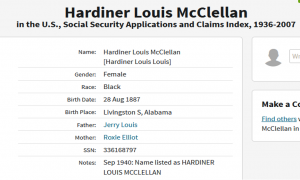
Roxie Elliott may have had a child with Jerry Louis in August of 1887. She would have been 18 years old at the time of the birth of the child. Their marital status is unknown. A marital record for them could not be located, but it cannot be discounted either. Although at the time of her lynching it appears she was unmarried, it is possible she could have been widowed, divorced, or Jerry Louis could have been absent from the home. There simply is not enough data to decide as to any relationship with Jerry Louis.
At some point, Roxie Elliott apparently moved from Livingston, Sumter County, Alabama to Brierfield, Alabama, a town located in Bibb County. In 1891, according to newspaper articles, Roxie Elliott was a resident of Brierfield and was employed as a schoolteacher.[3] Based upon the segregationist policies in force in 1891, she most likely taught at a school specifically for black students. Somewhere around March 28 to April 4, 1891, Roxie Elliott’s life came to a sudden and violent end when she was violently lynched by unknown persons.
Roxie Elliott’s Lynching
Roxie Elliott was lynched in an undisclosed location in Bibb County, Alabama in early April 1891. The perpetrators of her lynching were never identified. In fact, details surrounding her lynching are very scarce. The only available information located surrounding her lynching is from newspaper articles of the time. A copy of these articles is shown below. According to articles from both The Appeal in St. Paul, Minnesota and The Standard Gauge in Brewton, Alabama, Roxie Elliott, a black schoolteacher, was arrested for the crime of infanticide. She is alleged to have given birth to an illegitimate child which she allegedly murdered by hanging the child by the throat in a tree.[4] One article states she killed the child “in her effort to hide her shame” at having given birth to an illegitimate child.[5]
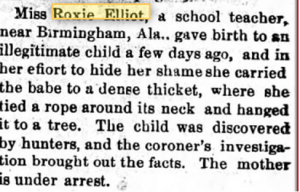
From the results of a coroner’s inquest, the child’s mother, Roxie Elliott, was adjudicated to have committed the crime and was arrested for it. See article from The Birmingham News, dated March 28, 1891.[6]
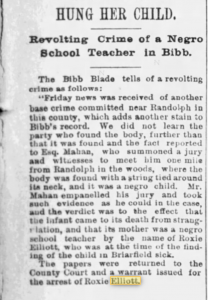

The Weekly Advertiser in Montgomery, Alabama, indicates Roxie Elliott, was arrested at Briarfield, Bibb County, Alabama.[7] Upon her arrest, she should have been held in the Bibb County Jail until she could be tried by either a jury or Judge to determine her innocence or guilt in the death of the child. Unfortunately, Roxie Elliott never made it to trial.
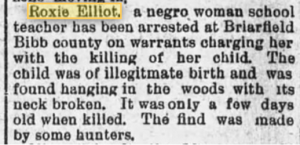
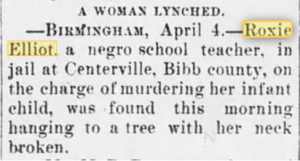
It appears that by April 4, 1891, Roxie Elliott was no longer alive. Somehow, despite being in police custody, she was lynched, and her body was “found hanging to a tree with her neck broken”.[8] The people who lynched Roxie Elliott are unknown. However, since she was in the custody of the police, one must question if the police were complicit in her lynching. The newspaper articles fail to provide any clues or any indication of who Roxie Elliott’s murderers may have been. It is unknown if she was killed by only a few people or if she was taken by a mob. What is known is that Roxie Elliott was brutally lynched and was denied the opportunity to defend herself at a trial and with a jury of her peers.
Lynching in Bibb County, Alabama
Roxie Elliott appears to be the first black female lynching victim in Bibb County, Alabama. Lynching was not unusual in Bibb County, nor the state of Alabama, at the time of Roxie Elliott’s murder. According to the Equal Justice Initiative’s interactive map for “Lynching in America”, Alabama has a recorded 360 lynching victims. Of those 360 victims, at least 11 were lynching victims in Bibb County. Based upon the commonality of this practice, it is highly probable there are more unidentified and/or unidentified lynching victims. By April 4, 1891, there had been at least 3 cases of reported lynching in Bibb County. Up to 1891, all the recorded Bibb County lynching victims were male. Roxie Elliott is the first female lynching victim able to be identified in Bibb County. Her lynching in 1891 reveals women, in addition to men, were subject to racial terror through lynching. Black women not only had to be concerned about the safety of her male relatives, such as husbands, sons, grandsons, fathers, etc., they also had to be concern about their own lives, lest they become of a victim of racial lynching too. Although most lynching involved male victims, women were not excluded from this brutal act. While women only contribute a small percentage of the overall number of lynching victims, the impact of women lynching sent a powerful message to other potential victims. It communicated no one was immune to racial violence and hatred.
For a long time, especially up to and during the Civil War Era, the South was portrayed as a genteel society, with much emphasis placed upon one’s honor along with a strong defense of one’s family with life being conducted under strict rules of decorum. These constructs applied to both men and women within the South. The roles of white Southern women were clearly defined in that she must be deferential to her spouse in all respects and her role in life was relegated to supervising her household and rearing children. A black southern woman was granted even less consideration than that of typical white southern women. Black women after the Civil War were relegated to the same primary roles as white women except black women were required to reflect deference in all interactions with white people. Failure to show the proper respect to whites by blacks could spell serious trouble for a black individual and could, and in fact did at times, cost someone his or her life.
Reflections on Roxie Elliott and her Lynching
Roxie Elliott’s lynching leaves quite a few unanswered questions. The accounts of her lynching are limited. Even further limited, are any personal details about Roxie Elliott and anything giving us clues as to who she was as a person. The “known” details about the lynching come from newspapers articles at the time which were often unfavorable in their coverage of black individuals. These articles point out several things perhaps meant to disparage Roxie Elliott. First, they label her as a negro woman. Secondly, they question her character as labeling her as an unwed mother. The articles basically assume Roxie Elliott’s guilt in the way they readily accept the coroner’s adjudication of guilt. The articles provide more details about the child’s death as compared to the details surrounding Roxie Elliott’s lynching. This creates a perception that Roxie Elliott’s lynching was justified, and her death warrants no further mention as to how her lynching was illegal and immoral. The way the articles were written appears to condone Ms. Elliott’s death by lynching.
Where the details regarding Roxie Elliott’s lynching undisclosed to protect the participants in her lynching? According to newspaper articles of the time, a coroner’s jury was empaneled by Esq. Mahan.[9] The article does not disclose who the jury members were, but it does state that Esq. Mahan chose the jury members. This raises a serious question about the impartiality of the jury panel. Did Esq. Mahan choose jury members who he believed would be sympathetic to his conclusions as to how the infant child died? Did he choose people who were his friends who he believed would be supportive of him? We do not know the answers to these questions but selecting a jury panel without a random selection process tends to lead to impartiality. Secondly, why were the names of the jury members undisclosed? Is this to keep the members of the jury panel from any stain on the process, such as a means to protect them? This is unknown but a possibility. Were there any black members on the jury panel? What information was obtained from the investigation and was presented to the jury panel? All of this is unknown and becomes circumspect. Was Roxie Elliott judged fairly? What information did she provide to the jury panel, if in fact, she was able to testify as a witness? What type of testimony did Esq. Mahan present that allegedly pointed to Roxie Elliott’s guilt? The whole process is buried with no available records to review. I do not believe coroner’s records were required to be kept during the 1890s. Without having further information, it is hard to determine what the actual truth is.
Troubling to me, is the fact that Roxie Elliott was in jail at the time she was lynched. If she were in police custody, it is reasonable to assume she would have been protected or should have been protected, by the law enforcement officials of that era. However, that clearly is not the case. One would assume there would be some form of protection for incarcerated individuals. The fact that she was incarcerated and suddenly ends up lynched is overlooked by the newspaper articles. Why didn’t they investigate and report on the circumstances by which she came to be lynched? Were the law enforcement officials complicit in Roxie Elliott’s lynching or did a mob storm the jail and take her? Without the article disclosing the mention of any mob members taking her from the jail, it leads me to believe she was voluntarily handed over, by law enforcement officials, to people set upon lynching her because of their assumption of her guilt in the death of the infant child. Further missing, are details about how many people were involved in her lynching? Was it just a few people or was there a mob of individuals? Also, were those involved in the lynching black or white? While somewhat unusual, some black lynchings by black people did occur in this era. Given the disregard to blacks by whites during this time, why were white people incensed over the killing of a black child? Many whites had little to no regard for blacks, so why would these same white individuals be so worked up over the death of another black child? I am not saying that they should not have been concerned with the killing of a black child but basing this question on the attitudes of that particular period. I believe black children’s lives were just as important as white children and the child’s killer did need to be brought to justice, but through proper legal means. The act of lynching Roxie Elliott seems contradictory. If they were punishing Roxie Elliott for murder, how could they condone murdering her? I do not understand the logic applied in any justification in the lynching of Roxie Elliott based upon 2 wrongs do not equal 1 right. Murdering Roxie Elliott was wrong, plain and simple, even if she did kill her own infant child.
Compounding the circumstances of Roxie Elliott’s lynching for me are questions I have regarding the child’s death. The death of the child was gruesome. From accounts, the infant child was killed by tying a rope around the child’s neck and hanging the child to a tree. Why would a mother choose to kill her child in that manner? While all murders are particularly gruesome, hanging the child seems especially horrific.
Considering the child’s manner of death, it makes me ponder if Roxie Elliott was, in fact, the child’s murderer. First, was Roxie Elliott the actual birth mother of the infant child? There is insufficient evidence to make this a full conclusion. But operating under the assumption the child was hers, I question if she killed the child. While not impossible, I found it hard to believe a mother could kill her child in this manner without there being more to the story. Of course, any ideas are pure speculation but do merit some consideration.
One plausible scenario is the possibility Roxie Elliott was framed for the child’s murder. The child’s hanging could have possibly been symbolic in nature. I think the hanging of the child must lead one to heavily consider this possibility. For example, Roxie Elliott could have given birth to a mixed-race child. The child would have been evidence of a banned sexual relationship, whether consensual or not, of a black woman and white man. This would have been punishable by law for both offenders at this time. In fact, a majority of black lynching was for the alleged crimes of assault against white women. Was the child taken from Roxie Elliott and killed by lynching to symbolize what happens when black and white people are involved sexually? Was the child killed to keep any relationship between Roxie Elliott and a white man concealed? Was the child killed by a possible white father to protect himself?
Another scenario is Roxie Elliott may have been raped by a white man and subsequently given birth to a mixed-race child. Knowing the child would condemn her to speculation about being involved sexually with a white man, could she have killed her child in this manner as a symbolic acknowledgment of what white people did to black people who had sexual relationships with the opposite race? Was the child killed in this manner for the crime of miscegenation? If she were raped by a white man, could the white man have taken the child and killed it this way to keep her silent? It would be a powerful reminder for her to keep silent lest Roxie Elliott comes to the same fate.
Was she guilty of the crime of miscegenation and knew she was doomed to be lynched? Did she kill the child in a symbolic manner to attempt to show white people how horrific lynching was and to expose their hypocrisy? There appeared to be a moral outrage of the death of a child by hanging versus no issues with killing the mother of the child. There is a double standard here.
With all my speculations on what happened to the child and why it was killed, I have not really addressed the issue of what if she did kill the child? How do I feel about Roxie Elliott then? Do I see her as a victim or was it right to punish her? I find the thought of the child’s death deplorable. The circumstances around the child’s death are horrific. Is my opinion of Roxie Elliott lowered if I believe she truly murdered her child for no reason other than she wanted to keep the child’s birth a secret in order to hide her shame? I do believe compassion and understanding is warranted, but that does not mean I do not believe she should not be punished. But I wholeheartedly disapprove of lynching, especially without due process and a trial to determine her guilt or innocence. I can sympathize with the shame she must have truly felt for having a child out of wedlock, so I believe Roxie Elliott should have been shown understanding in this regard. However, if she killed the child just to have it gone, then I do believe she deserves a stern punishment for that, but that punishment should only be after being properly convicted in a fair justice system and with the punishment being delivered by a judge or jury, and not by a mob. I have strong feelings about the death of a child by the hands of another person. My feelings are conflicted as I strongly oppose infanticide and believe that those committing infanticide should only avoid strong punishment under the most extreme or extenuating circumstances.
I am unsure what to make of the record I found with Roxie Elliott as the mother of Hardiner Louis McClellan from Livingston. The birth of Hardiner occurred on August 28, 1887, which was four years prior to Roxie Elliott’s lynching. The details of this child is unknown other than there was a social security application for Hardiner McClellan in 1940. This leads one to believe Roxie Elliott was already the parent of a child. We do not know the circumstances surrounding Roxie Elliott’s relationship with the child’s father, Jerry Louis. Based upon the newspaper articles, it appears he was not in the home at the time of the birth of the child. I do not know that I believe Roxie Elliott would have murdered the child to “hide her shame” if she already had one living child. This record is problematic for me because I do not know the marital status between Roxie Elliott and Jerry Louis, but if they were unmarried with Hardiner was born, that further solidifies an argument against Roxie Elliott murdering the infant child to “hide her shame”.
In 1891, in Bibb County, the county was undergoing an economic boom with the coal mining industry. Whites were afforded more opportunities for economic sustainment or advancement as compared to blacks. During the Reconstruction Era and shortly thereafter, many whites saw advancement while most of the black people of the county continued to experience depression-like living and working conditions. While both whites and blacks both had children born out of wedlock, white women had more possibilities for these children. White women often had the benefit of maternity homes and other social welfare institutions to care for the mothers and the children born to these women. These institutions often assumed the care of the children after their birth and included placement in orphanages or adoption to other families. Black women, however, were not afforded these opportunities and were often forced to keep any children born out of wedlock. Black women lacked access to the social institutions available for white women. In his article, “Infanticide and infant abandonment in the new South: Richmond, Virginia, 1865-1915”, E.C. Green indicates race played a key factor in the number of infanticide cases in the Reconstruction Era through 1915. His research reveals that because of the lack of access to social welfare institutions and being forced to keep children born out of wedlock, there was a higher rate of infanticide cases among blacks as compared to whites.[10] This is another example wherein more weight was placed on the value of white people’s lives versus black people’s lives. It is sad to know black women felt forced into making this decision because they lacked other options which white women had. It is sad to think of the lost lives and the valuable contributions these children could have made to our society and communities.
One area I wished to examine but could not find clear data on was the rate of out-of-wedlock births for black women in the late 19th century. I also wanted to see if I could find any information on attitudes surrounding black illegitimacy from that era. I could not find this information. What I did find was that there was an increase in both white and blackout of wedlock births in the Reconstruction Era forward. However, out-of-wedlock births were heavily frowned upon, particularly in the South. Once slaves were freed, they began to establish their own churches. However, these churches were often modeled after white churches and white Christian beliefs as these were the ideals forced upon them during their enslavement. Blacks adopted the white religion to make it their own version but still held many of the same viewpoints on morality as whites. The church was a center in the lives of recently freed slaves and was often the center of congregation and fellowship. As the church was a vital institution in the lives of blacks during post-Reconstruction, it is possible Roxie Elliott may have felt some level of shame at having a child born out of wedlock. She was a schoolteacher and more than likely held to a higher standard than other blacks within her community as she could directly influence young children. I do not believe the attitudes surrounding out-of-wedlock births differed greatly between blacks and whites at this time. However, it may have been more understandable in situations wherein black men were absent from the home due to other racial injustices, such as targeting black men in the community for “trumped” up crimes, leading to incarceration.
One aspect of racial bias I believe exists today regarding the blackout of wedlock births is the perception about blacks and social welfare. I believe if you were to ask a group of white people who has a higher rate of out-of-birth wedlock, the majority would respond that black people do. I believe this is because white people have been conditioned over time to think negatively of black people. Whether or not the statistics prove this is true or not, most would respond this way. But they would not take the time to ask why they think this. Blacks are usually poorer than whites. But why? Do most people stop to think of why this is? Do people take time to consider what has happened to blacks over the course of Reconstruction to leave them less economically secure than whites? I would argue that most people do not. I can say I did not until I began my lynching research. One of the things I have encountered is people making comments about black people having more children so they could get more money from the government. This includes TANF (Temporary Assistance to Needy Families), food stamps, and public housing. Even people my age have made these comments, all without a thought as to what they are saying. In a lot of cases, I believe they are just repeating things they have heard said by their parents or grandparents, or other close ties. I think it is an example of continued racial stereotyping that continues to plague our society today. Until we adjust our thoughts about race, these stereotypes will continue to exist and will continue to create further racial disparity but impede the process of reconciliation and addressing the race issue. I think a lot of people make these generalizations and stereotype blacks because they do not consider what may have brought them to the point of needing social assistance. Research does show that blackout of wedlock births have increased dramatically since the 1950s but it does not give a clear picture as to why. I believe it is because of racial inequality which has stemmed from hundreds of years of treatment of black individuals. Black people were kept economically suppressed by earning lower wages than whites, not being eligible for certain jobs, or being excluded or passed over for a white person. Due to this economic suppression, many blacks were forced into poverty. Once at a poverty level, it is almost impossible to escape. Many people my age do not recognize this. Add to this parental absenteeism, many black families have been limited to 1-parent households and incomes. Already faced with making lower wages, or the inability to find jobs, many blacks have not had the means to fully support their families. So, it is not a question, in my opinion, of blacks having additional children to earn higher benefits, but instead, having to utilize social welfare services as a result of racial economic disparity.
Racial injustice permeates almost every aspect of our lives. It is not limited to just one of two things. It is systemic and if you were to dissect a black person’s life and daily activities, I am confident you could find multiple examples each day in which their lives are affected by racial injustice and inequality. As white people, we do not see it because we have not experienced it. It is only when we can clearly outline and show these to people that perhaps we can persuade them to recognize these issues. However, some people do not want to change their ideals and opinions. They do not want to believe anything but what they believe, even when obvious examples are pointed out to them. We can only hope these people are in the minority and that many individuals recognize the impact of racial injustice and disparity upon members of our society and who have the commitment to make things better for blacks and to work for a greater understanding of the plight of black individuals and work to resolve these.
[1] Roxanna Elliot in “Alabama, U.S., Marriage Indexes, 1814-1935 for Roxanna Elliott,” Ancestry.com, Randolph, Talladega, Alabama.
[2] Roxie Elliott in “U.S., Social Security Applications and Claims Index, 1936-2007,” Ancestry.com,.
[3] “Alabama Annals / The Sayings and Doings of the People and the Papers.” The Weekly Advertiser (Montgomery, Alabama), April 09, 1891.
[4]“Hung Her Child.” The Birmingham News (Birmingham, AL), April 04, 1891.
[5] “.” The Appeal (Saint Paul, Minnesota), April 11, 1891.
[6] “Around Alabama.” The Birmingham News (Birmingham, AL), March 28, 1891.
[7] “Alabama Annals / The Sayings and Doings of the People and the Papers.” The Weekly Advertiser (Montgomery, Alabama), April 09, 1891.
[8] “A WOMAN LYNCHED.” The Standard Gauge (Brewton, Alabama), April 09, 1891.
[9] “Hung Her Child.” The Birmingham News (Birmingham, AL), April 04, 1891.
[10] E.C. Green, “Infanticide and infant abandonment in the new South: Richmond, Virginia, 1865-1915,” https://pubmed.ncbi.nlm.nih.gov/11623656/ (Bethesda, MD), April 01, 1999.